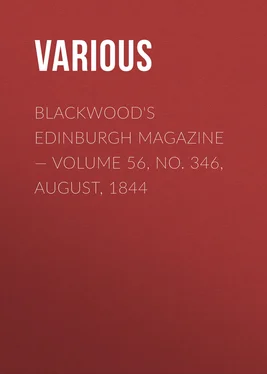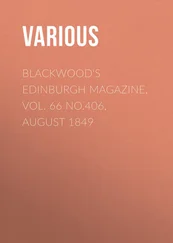Various - Blackwood's Edinburgh Magazine — Volume 56, No. 346, August, 1844
Здесь есть возможность читать онлайн «Various - Blackwood's Edinburgh Magazine — Volume 56, No. 346, August, 1844» — ознакомительный отрывок электронной книги совершенно бесплатно, а после прочтения отрывка купить полную версию. В некоторых случаях можно слушать аудио, скачать через торрент в формате fb2 и присутствует краткое содержание. Издательство: Иностранный паблик, Жанр: foreign_antique, periodic, foreign_edu, на английском языке. Описание произведения, (предисловие) а так же отзывы посетителей доступны на портале библиотеки ЛибКат.
- Название:Blackwood's Edinburgh Magazine — Volume 56, No. 346, August, 1844
- Автор:
- Издательство:Иностранный паблик
- Жанр:
- Год:неизвестен
- ISBN:нет данных
- Рейтинг книги:5 / 5. Голосов: 1
-
Избранное:Добавить в избранное
- Отзывы:
-
Ваша оценка:
- 100
- 1
- 2
- 3
- 4
- 5
Blackwood's Edinburgh Magazine — Volume 56, No. 346, August, 1844: краткое содержание, описание и аннотация
Предлагаем к чтению аннотацию, описание, краткое содержание или предисловие (зависит от того, что написал сам автор книги «Blackwood's Edinburgh Magazine — Volume 56, No. 346, August, 1844»). Если вы не нашли необходимую информацию о книге — напишите в комментариях, мы постараемся отыскать её.
Blackwood's Edinburgh Magazine — Volume 56, No. 346, August, 1844 — читать онлайн ознакомительный отрывок
Ниже представлен текст книги, разбитый по страницам. Система сохранения места последней прочитанной страницы, позволяет с удобством читать онлайн бесплатно книгу «Blackwood's Edinburgh Magazine — Volume 56, No. 346, August, 1844», без необходимости каждый раз заново искать на чём Вы остановились. Поставьте закладку, и сможете в любой момент перейти на страницу, на которой закончили чтение.
Интервал:
Закладка:
We have read with pleasure, and extracted, some of Mr Townsend's poetry; let us now see his etching. "Boyhood:" those who delight in the easy, every-day, every-hour play of boyhood, will enjoy this plate. A boy is, with a peacock's feather, tickling a child asleep in the arms of a grave old lady—so sedate have we seen grimalkin look whilst encouraging her kitten, lightly and coquettishly, to play with a ball of cotton. "The Beach" is a well-sketched coast scene, and shows Mr Townsend to have an eye for nature's scenery, as well as nature's sympathies. Very good is "The Model"—an artist sketching in the figure of a Lascar. But his best plate is "Sad Tidings." It is a very sweet figure—youth, elegance, tenderness, are there—and such an even melancholy light, or rather such a mournful evenness of light and shade, that, as a whole, it is neither light nor dark, and should have no other name than melancholy. He had the judgment and forbearance to hide the face—we know it is lovely, and that is enough; it is this, in part, which separates "Sad Tidings" from such subjects as they are usually treated. There are two etchings by Frederic Tayler—"The Chase" from Somerville, and "The Auld Grey" from Burns—both are lightly etched and good; but they have not that free and certain hand which marks Mr Tayler's style in his drawings, where one wash of the brush hits off his object with great truth. "The Gypsy Boy," by Mr Knight, is very masterly in chiaroscuro, and certainly characteristic of the race. Effect of chiaroscuro seems to be his aim. It is marked in his "Old Fable" (which always means the newest) of "The Peasant and the Forest." It is thus given: "A peasant once went into an old forest of shady oaks, and humbly entreated the same to grant him a small branch to make a handle for his axe, and thereby enable him to pursue his labours at home. The forest very graciously acceded to his request, and the peasant soon formed the required handle; but presently he began to lay about him in every direction, using the very substance with which the forest had furnished him out of its own bosom, and in a short time hewed down its whole growth."
Which are we bound most to admire—John Bell's pen or John Bell's needle? It is a difficulty. "The Devil's Webbe" is admirable in both. What a spider-like wretch is he, watching the toils that he has spread!
"This webbe our passions be, and eke the flies
Be we poor mortals: in the centre coyles
Old Nick, a spider grimme, who doth devyse
Ever to catch us in his cunning toyles.
Look at his claws—how long they are, and hooked!
Look at his eyes—and mark how grimme and greedie!
Look at his horrid fangs—how sharp and crooked!
Then keep thy distance so, I this arreede ye,
Oh sillie Flie! an thou wouldst keep thee whole;
For an he catch thee, he will eate thy soul."
And there they are! the winged insect lovers of pleasure, and of gain and strife—in one word, of sin—entangled in the ladder webb; while such a monster is in the centre, watching his larder. John Bell is instinctively a moral weaver. Fine-spun are his philosophical threads; we stop not to enquire if they will bear the tug of life. He is trying them, however, on the "tug of war." Pen and needle are set to work philosophically, methodically, benignly. In this he is but a unit out of many thousands. His opinions are not singular. Amiable moralist!— delightful is the dream, sweetly sounding the wisdom; but is it practicable? John Bell's warfare, "The Assault," is, without a doubt, "confusion worse confounded;" it is not easy, at a view, to find legs and arms and heads in their anatomical order. We must trace the human figure as through its map. Perhaps this is purposely done to resemble a battle the more truly, where limbs are apt to fly out of their places. But John Bell thinks—
"The play's the thing
Wherewith to touch the conscience of the king."
So he pours forth from his "Unpublished Play" a choice tirade against the royal play of human ninepins:—
"And then a battle, too—no doubt it is
A right fine thing; or rather to have been there.
But all things have their price; and this, methinks,
Is rather dear sometimes. Oh! glory's but
The tatter'd banner in a cobwebb'd hall,
Open'd not once a-year—a doubtful tomb,
With half the name effaced. Of all the bones
Have whiten'd battle-fields, how many names
Live in the chronicle? and which were in the right?
One murder hangs a man upon a rope,
A hundred thousand maketh him a god,
And builds him up a temple in the air
Out of men's skulls. A loving mother bears
A thousand pangs to bring into the world
One child; your warrior sends a thousand out,
Then picks his teeth."
Such was Shakspeare's momentary humour, when he put it into Falstaff's mouth to ask what honour is "to him that died o' Wednesday." It is a humour that won't last—'tis against nature—man is more than half belligerent, and has a "murder" in him (to give it a bad name) "that will out." Even the peaceable Ephraim took up the handspike, and used it too, with "friend, keep thee in thy own ship." The "friend" was hyprocrisy—the use of the handspike, natural; the very elements are at war, and were made to be so—storms are as necessary as sunshine. But excellent able John Bell likes sunshine best; and who does not like him the better for that? And sweet sunshine has he shed around "The good Mayde"—a sunshine that makes its own magic circle, within which evil spirits or evil men shall not come. Tempt on, ye wizards—she looketh upwards, yet think not she will fall or miss her way—the Unseen guideth her steps. Bell's account of the matter is, however, far better. Let him publish his quaint poem, all of it; the specimens warrant the request.
"Thus doth the goode Mayde, with a stedfaste eye,
Walke through the troubles vaine, and peryls dire,
That doe beset mayde's path with haytes full slie,
The trappes and gynnes of mischief's cunning syre.
Ne nought to her is riches' golden shower,
Ne gaudy baites of dresse and rich attyre,
Ne lover's talke, ne flatteries' worthless store,
Ne scandal's forked tongue—that ancient liar,
Ne music's magic breath, ne giddy wheel
Of gay lascivious daunce, ne ill-raised mirthe,
Ne promised state doth cause her mind to reel,
Or lure from thoughts of heaven to joys of earthe."
Our poet, a moralist etcher, reverts to the old subject; and we have "The Progresse of Warre," in a series, as part of a frieze for his Temple of Peace. This is most clear—for he who runs may read; yet, on a second view, we doubt that—for we see, what we did not at first see, writing under each tablet that is by no means intelligible. Having, with Mr Bell, seen an end of the battle, it is fit time, with Mr Herbert, to discuss "The Day after the Battle." "Next day did many widows come"— that verse of Chevy Chase is the subject. The slaughtered knight, the widow, and the dog, tell the tale, and tell it well too. The widow is the best figure. We have had enough of battle and all its horrors; let us turn to tranquillizing nature, where the undisturbed lichen may grow upon the rocks, and the branches of unpruned trees throw out their sheltering leafage, and the innocent insects know it is their home; and even in the seeming silence, if you listen, may you hear the still voice of a busy creation, a world of a few summer hours—yet seemeth it to them an eternity of enjoyment. And such a scene we have in the "Woody Scene," by Thomas Fearnley—poor Fearnley!—and is it not lightly, elegantly touched with the needle? the scene realized? Or, would you see a wilder spot, turn to his "Norwegian Scenery," and see the saw-mill, or whatever the building be, at the very entrance of the deep wood in its gloom, with the mountain torrent pouring over the rocks. In this sequestered spot, man has built him a home, and turned to human uses the rebellious waters, even on the very skirts of the wilderness; and there he is, for his hours are not all of toil, gloriously angling, for he has hooked his fish. Poor Fearnley! would he could have remained in this country! Had he been moderately patronised, he might have added an honourable name to our dictionary of painters.
Читать дальшеИнтервал:
Закладка:
Похожие книги на «Blackwood's Edinburgh Magazine — Volume 56, No. 346, August, 1844»
Представляем Вашему вниманию похожие книги на «Blackwood's Edinburgh Magazine — Volume 56, No. 346, August, 1844» списком для выбора. Мы отобрали схожую по названию и смыслу литературу в надежде предоставить читателям больше вариантов отыскать новые, интересные, ещё непрочитанные произведения.
Обсуждение, отзывы о книге «Blackwood's Edinburgh Magazine — Volume 56, No. 346, August, 1844» и просто собственные мнения читателей. Оставьте ваши комментарии, напишите, что Вы думаете о произведении, его смысле или главных героях. Укажите что конкретно понравилось, а что нет, и почему Вы так считаете.












